We’ve been talking about industry issues from the publishing standpoint for the last few days, but how are the creators doing?
WELL, Scott Snyder is doing swell! He launched his Kickstarter for Nocternal, a new horror book with Tony S. Daniel, and his new Image imprint Best Jackett Press on Monday, and it was funded at 200% by the end of the day for $80,000. It’s already up to $100,000 with 29 days to go. I would call this a rousing success. However, Snyder is NOT taking a cut:
This campaign isn’t about how much money we can raise; it’s about making sure we can create books we’re passionate about in a protected way. So a pledge from me (Scott) back to you: I will take NO PROFIT from this campaign. No page rate, no money at all. Any money made after we cover art and production costs for NOCTERNAL’s first arc, will go toward paying the artist on the next project I’m doing for Best Jackett (to be announced VERY soon)
Of the new imprint, Snyder told Zack Quaintance:
SCOTT SNYDER: I don’t want to give TOO much away, but I can say that I already have a number of books in production with an array of pretty amazing artists, some who’ll be familiar to fans of my work, some I’ve never worked with before. Really, though, the goal with Best Jackett is to try new things and challenge myself to be a better writer, better part of comics, give back. Just make something I’m proud of on every level. I’m nervous, but I’ve never been more excited in my career.
The Kickstarter is for a superdeluxe version of the first issue of Nocternal, which will also have a conventional release through Image. The swanky edition is 72 pages long and includes all kinds of process art and extras. It’s not quite clear if this is wrapped around a typical 24-30 page comics story, but that isn’t really the point of this edition — it’s a handsome collectible and funds more creative endeavors.
We haven’t really talked much about Image in the Pandemic Era aside from the general sense that they are in a bit of a lull now with Saga and Walking Dead not being published. Diamond shutting down all their trade sales couldn’t have been awesome, and reportedly caused cash flow issues for royalties. It’s good to see a big name like Snyder coming back — and he’s been quite open about mostly doing creator-owned work for the next while. Obviously all the changes at DC have affected a lot of creators there.
Which brings us to Case #2, Si Spurrier, best known for his Vertigo and now Black Label work. Although not quite a household name, Spurrier is a pretty well established writer, but he was hit hard by the cancellation of Hellblazer at issue #12, which he was writing. And he gives a snapshot of the whys and wherefores (typeface his):
IT DIDN’T MAKE ENOUGH MONEY.
[…]Hellblazer sold at least as well as The Dreaming, my previous book with DC’s Black Label imprint, in monthly form. That was greenlit through issue #20. I stepped off that series with great sadness because the allotted hour had come. The story was told, a new project had been offered; it was time.
With Hellblazer: no. Wasn’t time. Isn’t time. Covid-19 arrived and set our funny, fragile little industry on fire. The margins shifted. The risk/reward relationship changed. Someone, somewhere, decided that, trade sales be damned, it’s last orders at the bar. No lock-ins. No takeouts. Bones were cast, presumably an algorithm was consulted; that’s that.
I’d add a glint of suspicion that the very title itself, with a reference to an inferno-like afterlife for sinners, might not have been super hunky dory in a more Kid/YA focused DC. Spurrier doesn’t come out and say that but he does allude to the travails of the freelancers in These Uncertain Times:
I’ve written careful categorisations of the five major projects which were scheduled to keep me busy throughout 2020 — OGNs, Big 2 ongoings and a movie deal — each of which was torpedoed during the most relentlessly harrowing week of my life, thanks variously to Covid-19 and revelations about the ickiness of an intended collaborator.
Ouch.
Spurrier’s candid and heartfelt statement doesn’t seem primed to endear him to DC’s corporate structure, so I hope he does have some other stuff lined up.
Which brings us to a twitter thread by Jim Zub, which is another candid statement about How Things Work.
The majority of Marvel and DC work is top down, with editorial 'casting' writers and artists for specific projects they have in mind.
The exception is for exclusive writers who are invited to the creative summits. They have more latitude to propose future projects. https://t.co/oSmzCkBTUJ
— Jim Zub (@JimZub) August 18, 2020
I’ve taken the liberty of turning the thread into text since I find it so fascinating!
The majority of Marvel and DC work is top down, with editorial ‘casting’ writers and artists for specific projects they have in mind. The exception is for exclusive writers who are invited to the creative summits. They have more latitude to propose future projects.
In some cases, exclusive writers are asked to pitch events or events are generated as a group at the summits and new projects grow organically from those.
Once you’ve signed the standard idea submission paperwork, you can send other pitch concepts to editors, but if it’s a pet project it can be difficult to get traction. Most editors already have an intense slate, so adding even more to their workload is usually a tough prospect.
All that said, once you’re already working at Marvel/DC letting editors know that you want to work in their office and have ideas for the characters-teams they manage is a good idea. Ideally they remember that and ask you for a pitch when a good opportunity comes up.
That’s why I can be a bit of a broken record about my favorite characters. I want editors to keep me in mind for those projects. At Marvel that’s-
Conan
Spider-Man
Blade
Doctor Strange
Vision and Scarlet Witch
Almost any fantasy or supernatural character.
Those are my jam.At DC-
Harley Quinn
Green Arrow
Suicide Squad
Zatanna
Constantine
Almost any fantasy or supernatural character.I wrote most of the Conan scenes in Avengers: No Road Home. Which made it easier to pitch a Savage Sword of Conan story. And then the editor asked me to pitch a crossover which became Conan: Serpent War. Which put me at the top of their list to take over Conan the Barbarian.
That’s an unusually linear progression of related projects. You can see how each one inadvertently became an ‘audition’ for the next one.
As appealing as the idea is of an SNL style writers table with Kelly Sue DeConnick and Chip Zdarsky pitching their ideas for Bat-Mite in a zany all-laughs setting, the reality is a bit tougher. The Big Two have been “editor driven lines” for decades now, with the results you see before you. While this will not come as a surprise to anyone who has even briefly entered the orbit of working for the Big Two, it does have consequences. The role of editors as “brand managers” for movie IP spinoffs has been growing in the corporate comics era, and I will discreetly point out that not all comic book editors are great storytellers and leave it at that.
NEXT, an anecdote from Van Jensen also from Twitter and, again, I will convert it to prose for all to see.
A true story: When DC Comics moved to Burbank in 2015, a group of creators were flown out to make plans for the DCU. I met the new guy appointed to head book sales. I asked what his plans were to get DC books into the Scholastic Book Fair. 1/3
— Van Jensen (@van_jensen) August 18, 2020
A true story: When DC Comics moved to Burbank in 2015, a group of creators were flown out to make plans for the DCU. I met the new guy appointed to head book sales. I asked what his plans were to get DC books into the Scholastic Book Fair. He looked at me blankly. “What’s the Scholastic Book Fair?” he asked. I tried to hide how stunned I was. “Scholastic. They take books to every school in the country. Millions and millions of sales. That thing.” More blank stares. The person tasked with selling DC comics as books literally had not ever heard of the largest book-selling operation in the country. Perhaps because the audience was kids. Anyway, that guy got fired, and thank goodness DC later hired @michelewells.
I have a pretty good idea who this person was (as I recall he had a home video background), but he was let go in a fairly early VP purge at West Coast DC, for obvious reasons. Okay, brand managers and people who don’t know how to sell books. That was a bad mix.
I will admit that over the last five months I’ve been mostly obsessed with the business end of industry change — distribution, retailing and publishing. But with all the “pencils down” that happened, and projects stalled or killed or changed, and line-wide cutbacks at the two biggest money spenders in the business, making a living at making this stuff has gotten harder. I keep hearing dire things about several companies that aren’t Marvel or DC — although I also keep hearing that sales have been way stronger than anyone would have expected over the summer. Something to be investigated.
Snyder isn’t the only name creator going to crowdfunding and direct sales: James Tynion IV just launched a horror anthology, Razorblades, on a pay what you want basis a few weeks back, and Cullen Bunn and John McCrea also have various projects on various platforms.
Tynion is on a hot streak what with Punchline and Jokers and Something is Killing the Children, and he’s not sleeping on it. He’s launching a bunch of projects at different publishers, as explained in his newsletter, as well as his own Tiny Onion Studios webstore. (It should be noted that Tynion is teaming with editor Steve Foxe on many of these projects.) In his July newsletter he writes:
We live in a comics industry that is more disconnected than it has ever been before. The Young Adult Book Market feels like a foreign country to the Direct Market and neither of them seem to know what’s happening in the exploding Webtoon/Webcomic space. The most popular superhero comic of the last decade is a Manga that most big two superhero editors have never heard of. The mainstays of indy alternative comics are putting out phenomenal work by young creators like Nick Drnaso, but most of his contemporaries in the superhero space don’t know who the hell he is. There are hundreds upon hundreds of young illustrators dabbling in pseudo comics and pin-ups living off pins and artbooks they self-publish and distribute. There is a thriving, growing horror art community, and I keep following more and more of them every day.
There need to be more platforms that try and remind all of us that ALL these things are the same thing. And my generation, the rising Millennials entering our (no longer young) adult lives need to stop waiting for the older generations to present those platforms TO us. We need to make them ourselves. And to be fair, that’s exactly what I keep on seeing. More and more of us aren’t waiting for someone’s permission to make comics. We’re just making them ourselves. Folks in the Alternative space never STOPPED doing this. I’m sure they’d roll their eyes at me, the superhero kid, discovering the power of zines… But you know what? Fuck it. Zines are great. Self-published comics are great. I want more weird self-published shit by the big guns of the direct market comics industry. I would fucking love to see what weirdo comics some of my favorite writers and artists would make for themselves, with no interference.
As an Olde Timer, it warms my heart to see James Tynion IV discovering the thrill of breaking the thrall of Corporate Comics, even if he is writing Batman at the moment. He’s correct, though: Creators will certainly have less interference if even half of the rumors about shaky comics publishers I hear are true. They will also have fewer jobs. But luckily, there are more platforms than ever to get comics direct to consumers/readers.
Oh and one final business note, to bring this full circle: Although Snyder and Daniel’s Nocternal will be a Kickstarter and a regular comic, the totally wizard Kickstarter edition will also be available to retailers via something called Corner Box. As Snyder wrote:
Both editions will ONLY be available to Kickstarter backers. But, if we successfully fund, a unique edition of the unsigned softcover with a separate cover will be made available to retailers at a special price through a separate platform called Corner Box, where 10% of all profits will go to Binc (Book Industry Charitable Foundation) a nonprofit dedicated to assisting booksellers in need. Retailers have been heavily impacted by COVID-19 and we wanted to find a way to help.
Corner Box is a game distributor that was floated as an alternate comics distributor during The Great Blackout for comics back in March/April. Their website claims:
Delivering Comics, Games, Collectibles And More To Retailers In The 21st Century
Where wholesale buyers and sellers connect without the middleman.Welcome to a new kind of wholesale marketplace — a bridge connecting publishers and retailers to Comics, Games, and Collectibles. Corner Box brings simplicity, transparency and innovation to the industry we love!
Even though Diamond was an exclusive distributor for many companies, it seems that somehow games distributors can also sell comics? In addition to offering Nocternal, they also have been working with Sourcepoint Press, Scout Comics, and a few other smaller indie publishers. Yet another option. We are truly seeing comics distribution diversify in this time. Retailers, start your engines!
Different channels, different methods. We’ll be seeing more and more of that in the future. And if you see something that The Beat should know about, HMU!


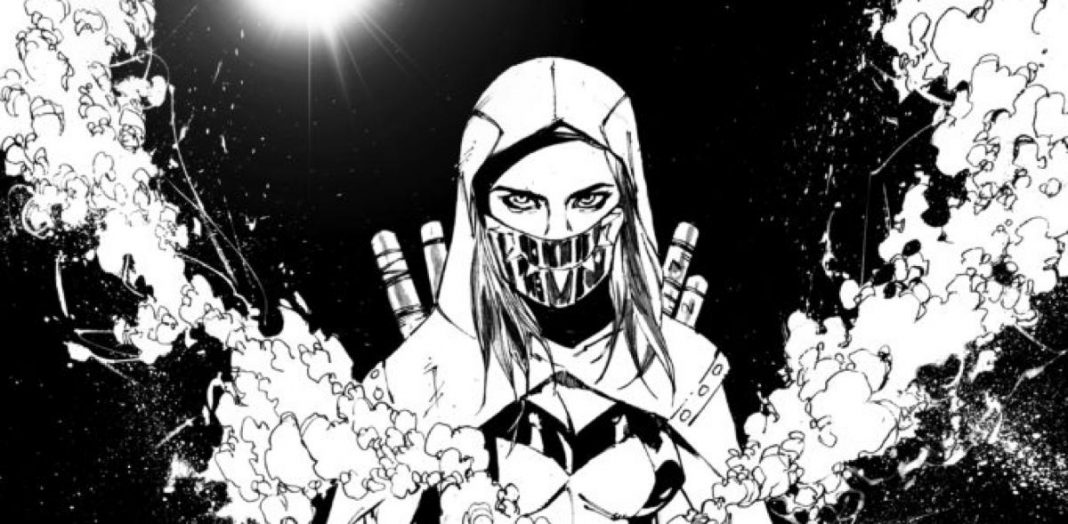
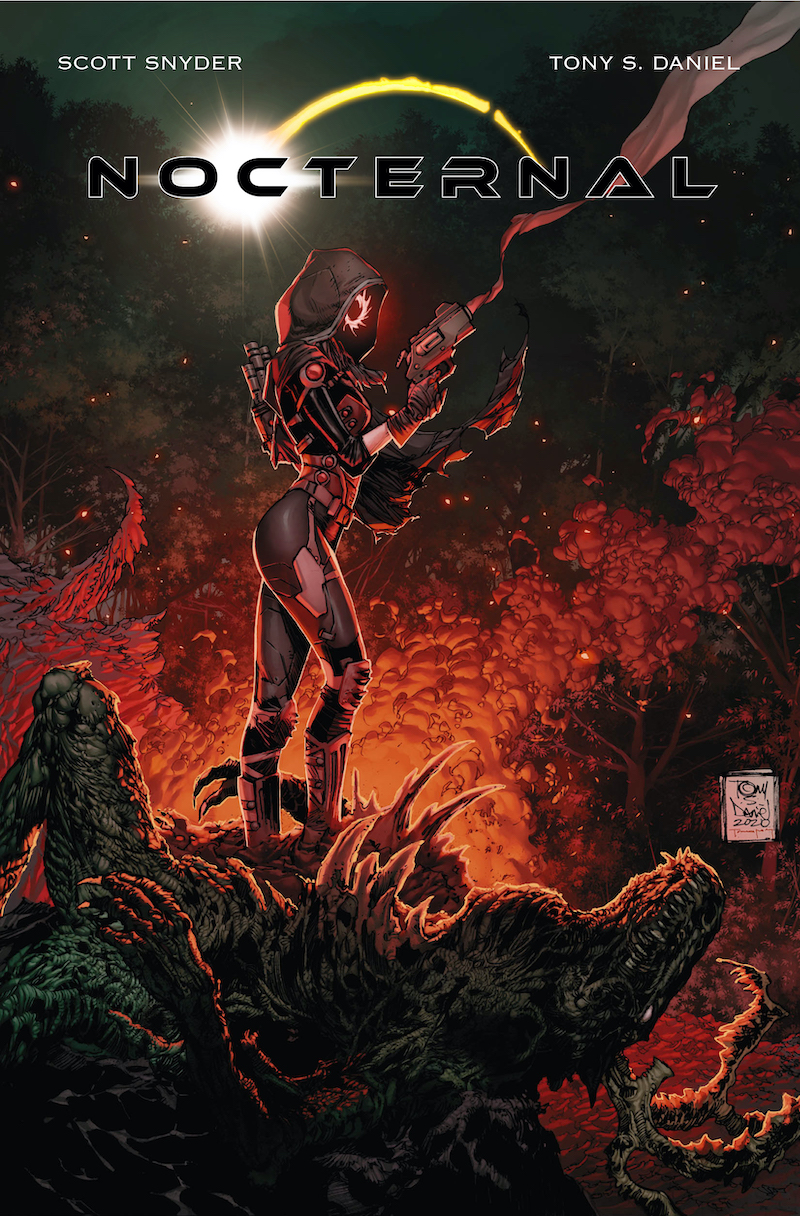
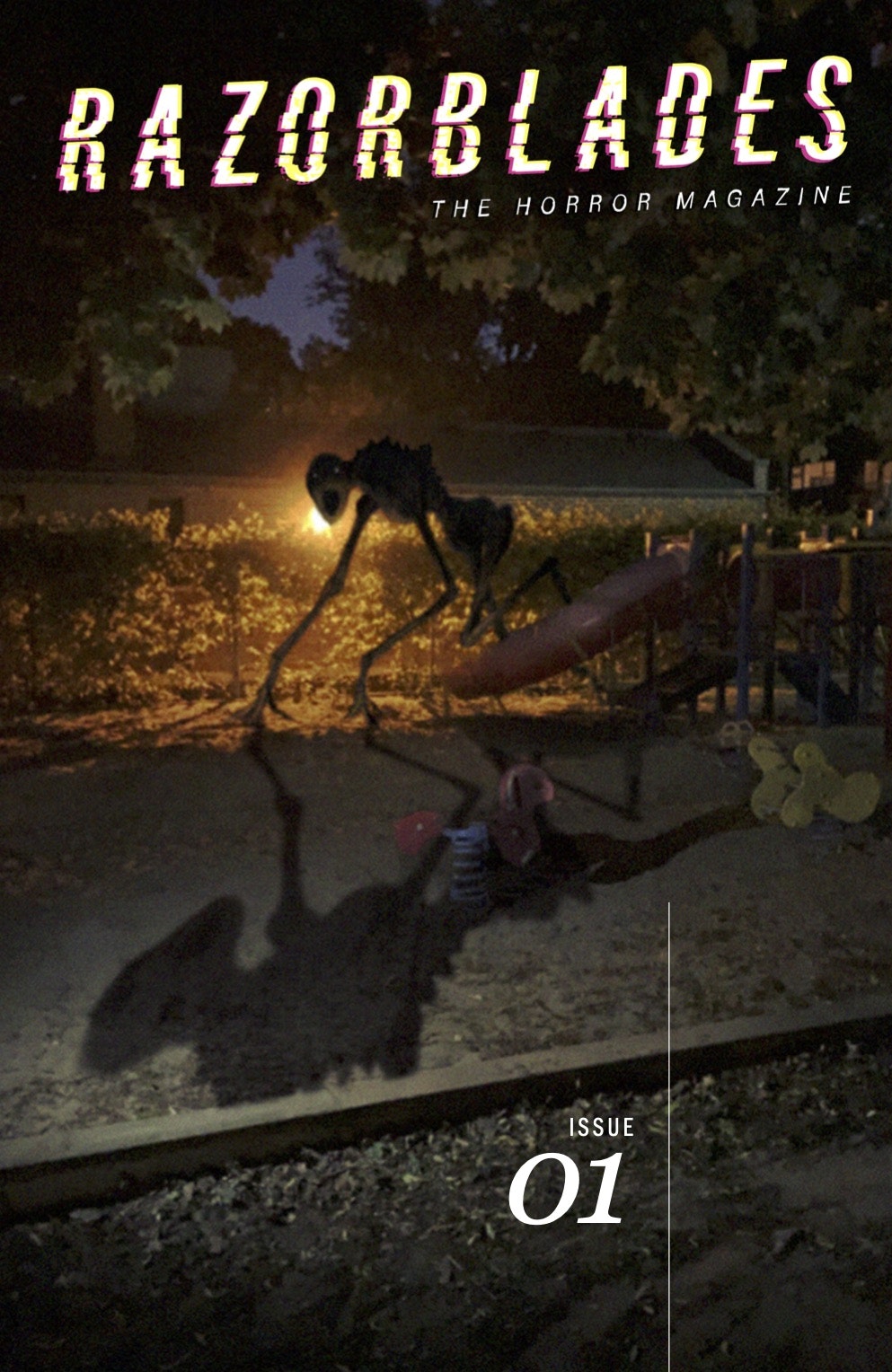
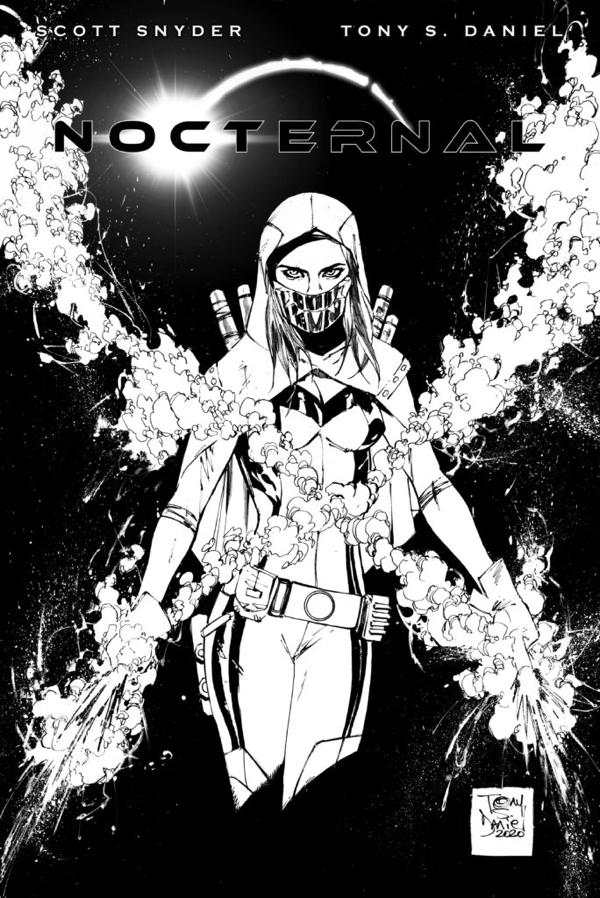


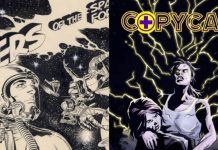


I know that this isn’t at all the main thrust of the article but that Hellblazer info is really disappointing. This has been the Hellblazer series I’ve wanted since, well, the Vertigo run ended. It’s really terrific and Si Spurrier really “got it”. I assumed the sales were just lower but to read that it was doing the same numbers as other books? Ugh. Not a good sign on many, many levels.
Snyder is using his privilege to do a diservice to other comics writers. “I will take NO PROFIT from this campaign. No page rate, no money at all. Any money made after we cover art and production costs for NOCTERNAL’s first arc, will go toward paying the artist on the next project ”
He’s creating a standard that writers aren’t allowed to be paid in any way for their creator owned projects. I get paying the artists and others FIRST, but this is kind of different. Not everyone is in the same privileged financial position as Snyder and these things tend to trickle down.
The Snyder statement of ‘no profit’ is funny because he seems to believe it. He isn’t really taking no payment. He is deferring payment- he is using the money to pay expenses on the next book which will result in a greater profit on the next book, at which time he will realize his payment for the Kickstarter.
I
There’s nothing funny or strange about Snyder’s position. That’s basically how a lot of start-ups and self-funded initiatives work. If you have enough savings to take care of your living expenses, you put all your capital and profits into growing the business, an you put off giving yourself a salary or taking a cut of the profits till the business is rock-solid.
I think the problem with Snyder’s remarks is not the precedent, but to say it’s not about how much money we raise is not why you’re on kickstarter. If he was offering some details about who he was planning to help maybe I’d think he was genuinely altruistic, but I guess good for him. As far as we know this money is just gonna fund another arc. CEOs do the same thing “offering” to take a dollar salary and getting millions in stock.
The impression I got from the Snyder comment was that he wasn’t making money off the KICKSTARTER portion of the project. He’d still take whatever profit he’s making of the traditional floppy edition of the book that Image is publishing. He specifically says, “this campaign,” in the quote reported.
Nice meaty piece here Heidi. Thanks! Hopefully when all these weird comics start pouring out of these disparate channels I’ll be able to find them.
It is pretty clear that Scott is saying all the money from the Kickstarter (after printing and shipping) is going to the artists drawing the series for Image. This is how he’s making the money to pay them advances.
He’s not saying he’s not taking a share of the profit on the monthly series when it comes out.
Comments are closed.